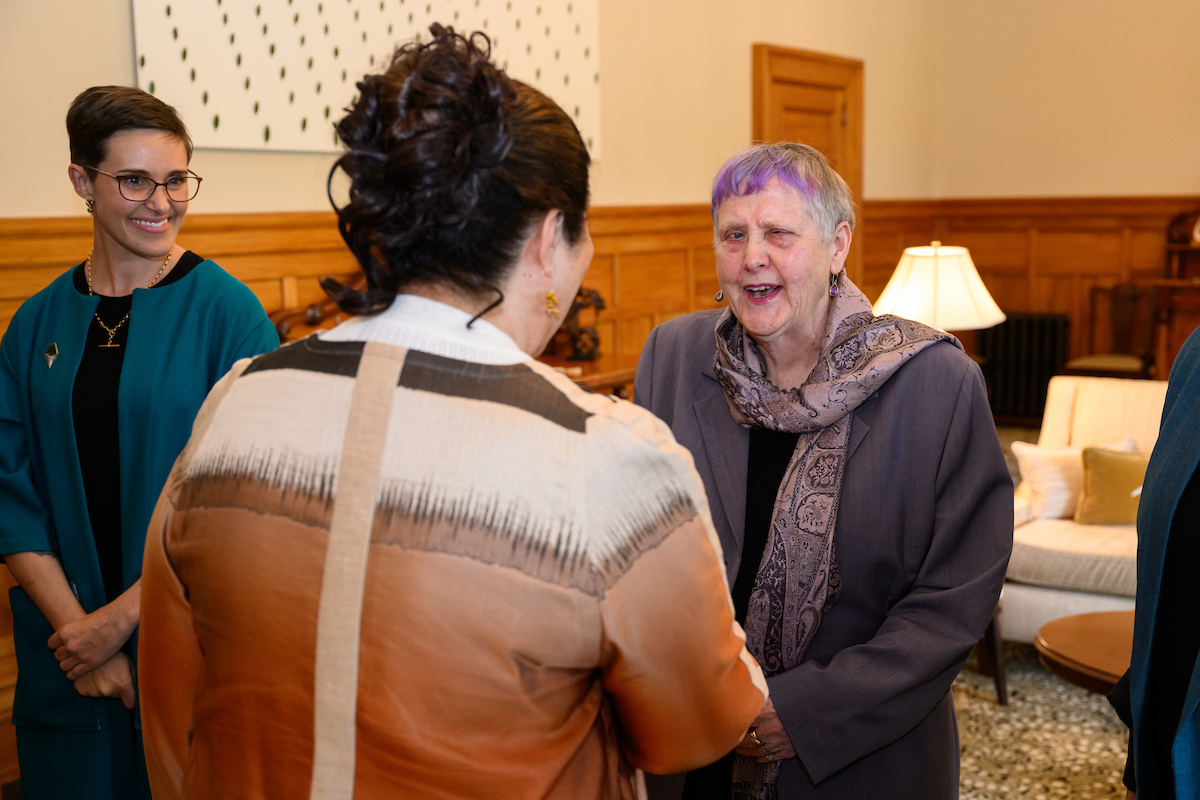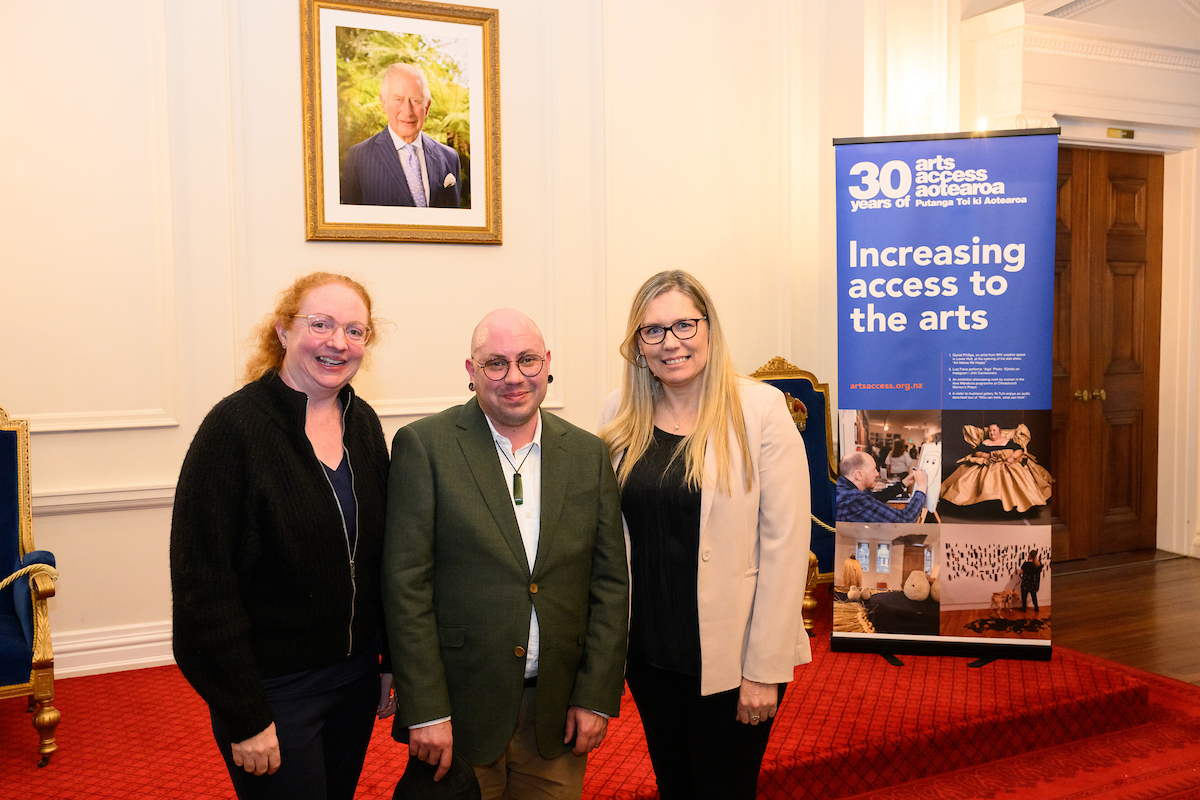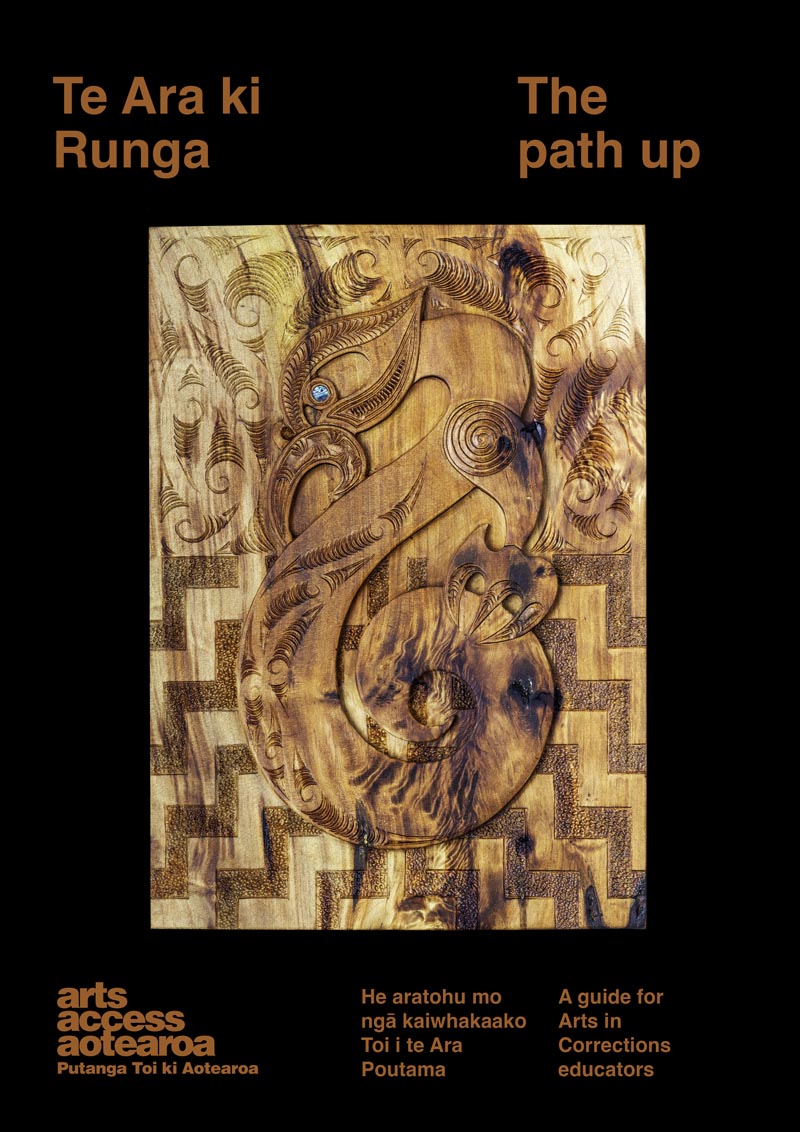 Robyn Hunt recalled the history of Arts Access Aotearoa from 1995 to 2025 in a speech she made at a High Tea event in Government House in July to celebrate Arts Access Aotearoa's thirtieth anniversary. This is her speech.
Robyn Hunt recalled the history of Arts Access Aotearoa from 1995 to 2025 in a speech she made at a High Tea event in Government House in July to celebrate Arts Access Aotearoa's thirtieth anniversary. This is her speech.
Happy thirtieth birthday, Arts Access Aotearoa. Back in 1995, I remember sitting on our sunny deck, talking to someone from Creative New Zealand about a new and exciting venture related to disability and the arts.
I had high, probably unrealistic expectations, but I’m an eternal optimist. I had seen innovative disability arts in the UK and the United States.
Arts Access Aotearoa began in a time of change
The purpose of this new organisation meant change – and it still means change. Arts Access Aotearoa began in a time of change. A few years earlier we’d had the “mother of all budgets” but we had also campaigned for, and won, the inclusion of disability in the Human Rights Act.
Change was in the air. Deaf and disabled people were becoming more assertive and activist. They were taking groundbreaking action in tertiary education, transport and in human rights, lodging a complaint that would lead to the establishment of the relay service for Deaf New Zealanders.
Of course, as in most things, progress is usually slower than we want. But the Deaf and disabled communities had increasing expectations.
Creative spaces were already established by 1995. Vincents Art Workshop in Wellington opened in 1985 and today 65 creative spaces deliver arts programmes in communities across the motu to more than 40,000 people. The creative spaces team of Fiona Sharp and Jazz Lolesio provide professional development opportunities, resources and support to the Creative Spaces Network.
Access to the arts a basic human right
Arts Access Aotearoa believes that access to the arts is a basic human right and the UN Disability Rights Convention, article 30, enshrines that right.
New Zealanders played a leading role in the development of the Convention on the Rights of Persons with Disabilities (CRPD), which New Zealand ratified in 2008.
As a Human Rights Commissioner, I participated in many working meetings at the UN and was delighted with that inclusion.
I used to think about the arts as the roses to go with the bread, but the arts are both the bread and the roses, fundamental to our individual wellbeing and our collective humanity.
Arts organisations and artists encouraged to innovate
Today, exciting ventures are gaining momentum and encouraging arts organisations and artists to innovate.
 Stace Robertson’s vision has developed into Taha Hotu, the groundbreaking initiative establishing a network for Deaf and disabled artists to connect with one another. Importantly, it provides the accessible resources necessary to develop our practice, career paths and connection to each other through the website. This is arts community building at its best.
Stace Robertson’s vision has developed into Taha Hotu, the groundbreaking initiative establishing a network for Deaf and disabled artists to connect with one another. Importantly, it provides the accessible resources necessary to develop our practice, career paths and connection to each other through the website. This is arts community building at its best.
Katie Querin is enlivening the wider Arts For All Network, supporting more than one thousand participating live performance venues, producers, artists, festivals and cultural institutions in the GLAM sector to fire up the multitude of accessible services and standards as business as usual rather than add-ons.
Creative New Zealand’s benchmarked survey shows that Deaf and disabled people in Aotearoa already have higher rates of both attendance and participation in the arts compared to the general population. 64% of Deaf and disabled individuals reported participating in the arts within the past year.
Te Ara ki Runga a world-first training guide
Working in the justice system, Neil Wallace’s vision has enabled Arts Access Aotearoa to develop what is thought to be a world-first training guide, “Te Ara ki Runga The Path Up”. This guide supports both new and established Arts in Corrections educators to deliver high-quality and meaningful arts programmes in New Zealand prisons.
 This beautifully produced resource is an innovation other countries want to follow. It might seem counter-intuitive but this project represents hope. We need hope right now and the arts, while speaking truth to power, and bringing joy as they have always done, also bring hope.
This beautifully produced resource is an innovation other countries want to follow. It might seem counter-intuitive but this project represents hope. We need hope right now and the arts, while speaking truth to power, and bringing joy as they have always done, also bring hope.
With hope comes promise of future growth and expansion. There are no limits for disability arts. Our rich, often neglected or appropriated thread is woven through the human experience. Accessibility is also an inventive part of the creative process.
Arts funding is always a struggle and so we need everyone who can to support the work of Arts Access Aotearoa. It is unique.
Working and contributing to the arts world is sometimes difficult but deeply rewarding, and the people at Arts Access Aotearoa are great. I’ve acknowledged only a few of them.
Richard said I had to mention that I was an Arts Access Accolade recipient but I happily acknowledge other award recipients such as Pati Umaga, Rodney Bell, Hone Fletcher, Duncan Armstrong, Judith Jones, Pascale Parenteau, Sharon Hall and many more.
I acknowledge all the skilled and dedicated staff and board members who have nurtured and continue to nurture and serve Arts Access Aotearoa. Executive Director Richard Benge is leading Arts Access Aotearoa as a creative powerhouse. Thank you all. Onwards and upwards for the next thirty years!
LATEST POSTS
- Shift perspectives and improve funding outcomes
- How to use pūrākau in Arts in Corrections
- The light bulbs that art turns on
- Telling your story to “persuadables”
- Art as rehabilitation: the case for creativity in prisons
- Arts For All Network on the road
- Remembering David Cameron: a humble master of Mahi Toi
- Onwards and upwards for the next thirty years
- Lived Experience Advisory Group launched
- Arts For All Network, shaping a more accessible future


